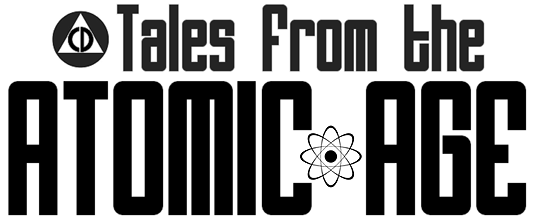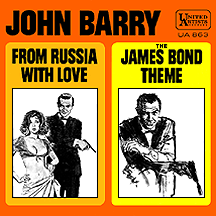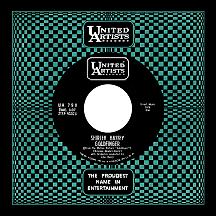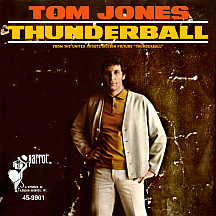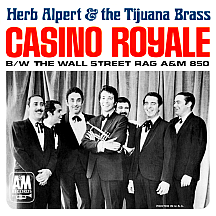James Bond Songs:
The '60s Spy Music Sound
First off, let's get one thing straight: Barry Nelson was the first actor to play the role of Ian Fleming's famous international spy, James Bond. He starred as Bond in a television adaptation of the first book in the series, Casino Royale, on a one-hour episode of CBS-TV's Climax! in October 1954, just 18 months after the book's publication and more than seven years before the first theatrical film based on a Bond book. Often it's said that Sean Connery was the original 007; some years ago, after seeing such a remark printed in the local paper, I wrote the author of the article to point out his error. He was nice enough to reply, but I didn't like what he had to say: "Well, technically Nelson was first, but..." followed by a brief dissertation on how no one really cares about anything that came before Connery. When Nelson died in April 2007, Fox News took things to the opposite extreme, playing Monty Norman's iconic recording of "The James Bond Theme" as a lead-in to the story, disregarding its stuck-like-glue connection to the film series and nonexistence at the time of the Climax! episode. Careless media inaccuracies aside, history is clear on one thing: Barry Nelson was the first to portray James Bond. Period. Case closed.
Of course, it was only after Connery appeared on the big screen voicing his "shaken, not stirred" drink preference that James Bond became the phenomenon we all know so well, leading the way for the six other actors who have kept the character's image alive over the last five decades (though perhaps only three of the six have been widely accepted by the moviegoing public). One other facet of the Bond image has been the music, perhaps equally as important as Connery himself in those early years. The decision to use a guitar riff (supplied by British session guitarist Vic Flick) as the theme's hook, a sound with similarities to British bands like The Shadows and American surf music instrumentalists making inroads at the time, gave it a rock sensibility that served as bait to pull in a young audience. The first feature film, Dr. No (based on the sixth book in the series), was released in the U.K. in October 1962 (hitting America in May '63). Norman's score, with a few exceptions, featured Calypso songs in line with the film's Jamaican setting. It was those exceptions, including "Dr. No's Theme," that laid the groundwork (along with the title theme) for what would become a trademark sound in successive film scores.
When John Barry took over as composer and conductor of the Bond franchise, his jazz-influenced orchestral scores added to what Norman had begun, covering the rest of the spectrum for adults, the series' primary target. Like few other film scores, the music of James Bond became an ever-present part of the soundtrack to people's lives in the 1960s along with The Beatles, Motown, folk rock, television themes, commercial jingles and other types of music. From Russia With Love debuted in October 1963 in the U.K., delayed as the first had been for U.S. release, crossing the pond in April '64. Matt Monro, one of the great, underrated singers of the '60s, supplied a vocal version of the film's theme (an element missing from Dr. No), a practice that would continue with nearly all forthcoming installments. Barry's scores incorporated Norman's original theme, leading to a rift over royalty payments; it took a lawsuit to straighten things out, and Norman has received royalties ever since. Still, the music of the Bond franchise entered the mainstream with Barry's rich orchestrations and recurring melodic trademarks running throughout. "007" made its first appearance in this film, endeavoring to establish another theme for the series, but the original "James Bond Theme" prevailed. Cover versions began appearing as the popularity of the series grew; there were at least a handful of "From Russia With Love" records on the market in 1964, including minor chart entries by The Village Stompers and Al Caiola.
Bond was a sensation and Connery had become a worldwide superstar. The music's influence began to seep into the work of other composers writing for films while several TV series, in particular, were clearly inspired by Bond's boss theme. The Man from U.N.C.L.E. (which benefited initially from Fleming's creative input until the Bond series producers, Eon Productions, pressured him to drop out) premiered on NBC in the fall of 1964 with a guitar-based theme by Jerry Goldsmith and a definitive single version by surf band The Challengers. Danger Man, a British series from 1960, had a run in the U.S. in '61 on CBS; for its return to the States in '65 it was given a new name, Secret Agent, and a new theme sung by Johnny Rivers ("Secret Agent Man"), a top ten hit the following year. The Avengers, a popular British series since 1961, debuted on American television in 1966 with a stunning new orchestral theme by bandleader Laurie Johnson. Even Neal Hefti's theme for the Batman series in '66 had roots in the spy music movement.
On the big screen, Our Man Flint appeared in early 1966 with a suspiciously Bondian theme song. Spy spoof The Last of the Secret Agents? had just one redeeming feature: its groovalicious title song by Nancy Sinatra. Motown's Smokey Robinson and the Miracles got in on the act with the theme from Come Spy With Me in '67. There were many, many other (and lesser) films in the genre featuring knockoff Bond-inspired theme songs.
Ian Fleming's novels (a dozen strong by 1964) were flying off the racks in the U.S. in 50 cent Signet editions. Fleming's death in August abruptly ended the amount of material at 14 books (two more were published posthumously), including two short story collections, so Eon Productions had a limit on the number of films they could make based on the original author's works. There was less of a delay between the release of Goldfinger in the U.K. (September 1964) and America (December). The series was gaining steam, evidenced by a notably increased box office (it was 1965's third biggest moneymaker, trailing two Julie Andrews blockbusters, The Sound of Music and Mary Poppins) and the chart-busting success of the film's theme and soundtrack.
Welsh-born Shirley Bassey, largely unknown in America but a star in Britain since 1957, was tapped to perform the film's theme, a brassy, spy-sational effort that was impossible to ignore when it came on the radio. "Goldfinger" went top ten in March '65 and the accompanying soundtrack simultaneously hit number one on the album charts. Dozens if not hundreds of artists, mostly instrumental acts, followed quickly with versions of the theme in pop, jazz and rock renditions. Prolific Los Angeles session guitarist Billy Strange had actually sneaked out his instrumental cover of "Goldfinger" in late '64 before Bassey's version hit. Pianist Jack LaForge and jazz organist Jimmy Smith also released popular versions. John Barry belatedly offered up his own recording of Norman's "James Bond Theme" on a single backed with "From Russia With Love," both from the album release John Barry Plays Goldfinger.
No time was wasted in getting Thunderball produced and into theaters by the end of 1965. Another singer from Wales, Tom Jones, who'd become a star since the previous film, supplied the theme song, already climbing the charts when the movie hit theaters in time for Christmas. Originally Barry composed "Mr. Kiss Kiss Bang Bang" for use in the film, recorded first by Bassey and then Dionne Warwick, but neither version was used; Barry's instrumental version is in the film and was included on the soundtrack album. Thunderball was the most successful of all James Bond releases until the '90s, ranking as the year's number one box office hit of 1966.
A lag in the yearly release schedule enabled an "unauthorized" Bond adaptation to get into theaters and cash in before Eon's fifth installment with Connery was released. Casino Royale, the only Fleming novel not licensed to Eon (dating back to the 1954 CBS production with Barry Nelson), was picked up by MGM and conceived as a parody of the Bond series with David Niven as 007 and a bevy of "fake" Bonds to further confuse the enemy...and moviegoers. Despite an all-star cast, the film was a muddled mess yet did extremely well at the box office. Composers Hal David and Burt Bacharach wrote the score, though the music lacked any similarity to the Bond themes of Eon's films. They did come up with a nifty instrumental title theme, a hit for Herb Alpert and the Tijuana Brass, in addition to "The Look of Love," performed by Dusty Springfield, also a hit and an Academy Award nominee for Best Song.
You Only Live Twice hit theaters in June 1967, less than two months after Casino Royale, another big moneymaker (though not of Thunderball magnitude). Nancy Sinatra, seasoned at the spy game (after her theme for and role in The Last of the Secret Agents? a year earlier), became the first non-British singer to contribute a theme song to what is generally considered the official series. Sean Connery decided he wanted out after this film (but later reconsidered - twice!). The next Bond film, On Her Majesty's Secret Service (released in December 1969), starred George Lazenby and featured an instrumental title theme, a new wrinkle on Barry's earlier 007 scores while staying consistent to the formula. Another American, Louis Armstrong, made a vocal contribution with "We Have All the Time in the World." Though well-reviewed, Lazenby's one and only turn as Bond had a disappointing run in theaters and Connery was convinced to return for the next outing, Diamonds Are Forever, in 1971.
Of course, James Bond has had a life far beyond the 1960s and billions of dollars have been made in the process. A variety of music acts including Bassey (Bond diva extraordinaire, returning for two additional film themes), Wings, Lulu, Carly Simon, Sheena Easton, Rita Coolidge, Lani Hall, Duran Duran, a-ha, Gladys Knight, Patti LaBelle, Tina Turner, Sheryl Crow, k.d. lang, Garbage, Madonna and Adele have gone along for the ride, scoring hits (and even a few awards) along the way.
BOND SONG CHRONOLOGY:
- The James Bond Theme - Monty Norman - 1962
- Dr. No's Theme - Monty Norman - 1962
- The James Bond Theme - John Barry - 1962
- From Russia With Love - John Barry - 1963
- From Russia With Love - Matt Monro - 1963
- 007 - John Barry - 1963
- From Russia With Love - Kenny Ball and his Jazzmen - 1964
- From Russia With Love - The Village Stompers - 1964
- From Russia With Love - Al Caiola - 1964
- The James Bond Theme - Billy Strange - 1964
- Goldfinger - Billy Strange - 1964
- Goldfinger - Shirley Bassey - 1965
- Goldfinger - Jack LaForge - 1965
- Goldfinger - Jimmy Smith - 1965
- Thunderball - Tom Jones - 1965
- Mr. Kiss Kiss Bang Bang - Shirley Bassey - 1965
- Mr. Kiss Kiss Bang Bang - Dionne Warwick - 1965
- Mr. Kiss Kiss Bang Bang - John Barry - 1965
- Thunderball - Peter Nero - 1965
- Thunderball - Santo and Johnny - 1965
- Thunderball - Jimmy Sedlar - 1965
- Casino Royale - Herb Alpert and the Tijuana Brass - 1967
- You Only Live Twice - Nancy Sinatra - 1967
- You Only Live Twice - The Bob Crewe Generation - 1967
- The Look of Love - Dusty Springfield - 1967
- The Look of Love - Sergio Mendes and Brasil '66 - 1968
- On Her Majesty's Secret Service - John Barry - 1969
- We Have All the Time in the World - Louis Armstrong - 1969
- Diamonds Are Forever - Shirley Bassey - 1971


